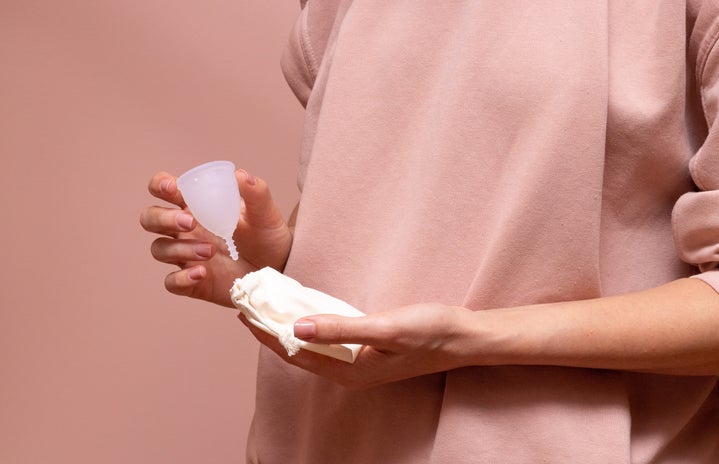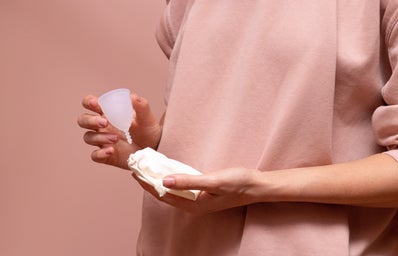“The only blood that’s not born from violence, yet it’s the one that disgusts you the most” – Maia Schwartz.
Menstruation has been a taboo for a long, long time. Fortunately, in the last few years, we started talking about it. With the rise of knowledge about the relationship between intimate health, environment, and self-care, alternative period products are becoming more and more common.
Did you know that during a woman’s fertile life, she spends around R$6000 (US$1050) and produces 200kg (440 pounds) of garbage in disposable pads, which take 400 years to decompose? Going for sustainable methods not only helps our planet, but it also costs us less.
However, it’s important to consider that 4,2 billion people have no access to adequate sanitation services, and 3 billion lack basic hand hygiene facilities (OMS data). Therefore, many women are unable to sanitize alternative products properly. And there’s more: 1 in every 4 Brazilian teenagers can’t afford tampons. That’s what non-profit organizations such as Fluxo Sem Tabu work for.
We should help the way we’re able to. Menstrual dignity goes through basic sanitation, education, and access to products. Consider reducing your tampon consumption and donating what you save to institutions that assist the most vulnerable strata of society and put menstrual poverty on the debate!
Check below the experience some women had with these sustainable options!
- Menstrual Cup
-
Luiza Ozeas, 17, tells us that it takes some time to get used to it. To find the fold that fits the best, to realize the adequate moment to insert the cup. “If you feel that something’s not right and that you’re in pain, it’s important to understand your body’s limits. Some people get used to it, some people don’t, and that’s ok. We must be honest with ourselves”. She says there are cycles in which she struggles with the cup and there are others she barely remembers it’s there: “I’m still adapting. I bought it 6 months ago. If you insert it the right way, it forms a vacuum, and nothing leaks. There must be patience”. Luiza believes the menstrual cup does great when it comes to hygiene. She sterilizes it every cycle by placing it in a glass filled with alcohol and heating it for five minutes on the microwave. You must clean it every time you’ll change it.
“I’m enjoying it a lot. It’s being a very good experience because I got to know my body and my cycle better. I used to have a really bad relationship with my period. I’ve always had lots of cramps and, due to chemists in disposable pads, the blood’s smell changed. I thought it was stinky and gross. When I started using the menstrual cup, I realized I had many wrong ideas about what menstruation means. It’s a cycle renewal. I feel fine because I know I’m not affecting the environment. A word for those who intend to start is ‘persistence’. Don’t give up, it’s a test. I took about 3 cycles to get used to it and I’m still adapting”.
“We realize our periods don’t smell bad, that there’s no problem if the blood remains in contact with our skin, that sometimes we don’t bleed as much as we think we do” – adds Ana Beatriz, 17
ATTENTION: Many women claimed to experience pain when taking off the cup or to be disturbed by its little cable. Don’t pull off quickly: be gentle and let the vacuum spread before undocking the cup. Also, it’s possible to cut a little part of the cable, but not too much, otherwise it will be hard to take off the collector. It’s important to remain relaxed because nervousness contracts the area’s musculature and makes the process harder
- Menstrual Disc
-
“Collectors contribute so that we don’t bring so much garbage to this planet, even though I wonder what we’re going to do with all this silicone” – Marianna Ferrari, 29, tells us that the menstrual disc didn’t bother her at all. However, she felt disturbed by the cup, saying that it pressures the urethra. Besides being more comfortable, Marianna believes that the disc holds better too. “But it has to be very well fitted. You must know your vaginal canal so that it can remain at the entrance to the uterus, otherwise, it will leak. I still struggle a bit, because I’ve only been using it for 3 months, so I’m still adapting”.
Marianna says it’s excellent in terms of hygiene. She tends to take it out at home or where there’s a sink nearby. She pointed to a very important matter: nervousness and fear: “The cup has the vacuum issue. It’s difficult to pull off, so the person can’t be tense. I had to squat, breathe and pull it calmly. The disc only requires a certain angle. I don’t feel 100% at ease, though. I still have to talk to myself and my body to relax and put it in. It’s a process, but when you get to do it, you forget it’s there. It’s ideal when it comes to practicality and efficiency to retain the blood. Also, it only has one fold, so it’s very simple”.
- Reusable Cloth Pads
-
Maria Eduarda, 14, loves them. She says they overcome the expectations and don’t leak at all, even during the night. Her only recommendation it´s not to use them for so long because they can stain with intense flows. Also, she says it’s important to place them correctly so that they don’t rumple.
Ana Beatriz, 17, shares Eduarda’s opinion. She, who has a skin allergy, found no problems with the reusable cloth pads. It didn’t leave any bad smell, leak, or stop her from wearing any kind of clothes. She uses them for 6 hours and says that the product does what it promises. Ana washes it with running water and no soap, claiming that it cleans perfectly.
- Period Underwear
-
Leticia Cassiano, 18, discovered this underwear in 2019 but, until she dived into topics such as ecology and natural gynecology, she didn’t replace the disposable pads. “Since it’s a relatively expensive technology, I only managed to buy the basic kit at the end of 2020. First and foremost, these underwears are absolutely comfortable. For some moments, I forget I have my period”. There are panties for every type of flow. It’s necessary to test and study what’s the best one for you.
“To the adepts of natural gynecology, it’s possible to soak and use the water to plant the moon (a ritual to nourish plants and women’s connections to their periods). Going through this process reframed my relationship with my body, my cycle, my nature, and spirituality. I sometimes study about feminine’s history, sacred female, ancient goddesses, subjects I always appreciated, but that have more meaning now”.
——————————————————————
The article above was edited by Nicoly Bastos.
Like this type of article? Check Her Campus Cásper Líbero home page for more.


